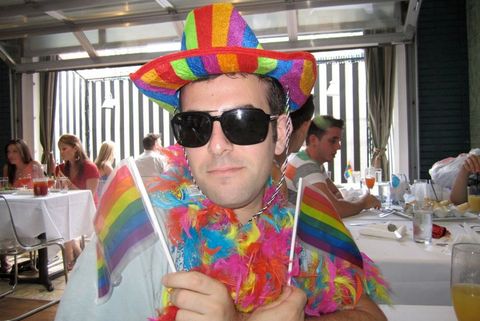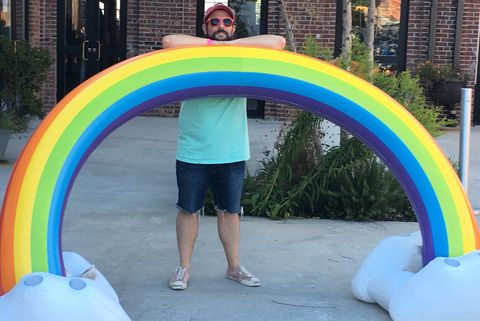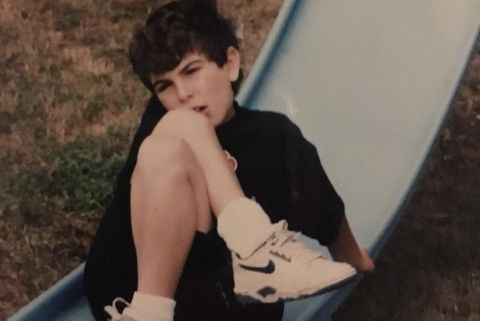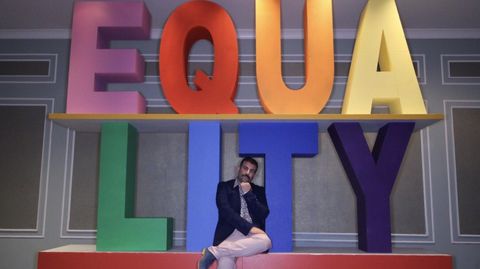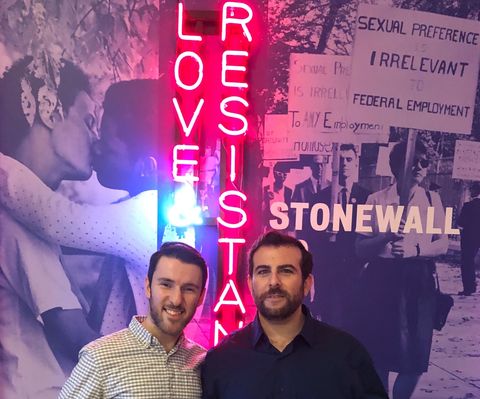People always like to ask, “When did you first realize you were gay?” That answer changes depending on the day. Sometimes, it seems like I always knew in the back of my mind. And other times it feels like something that didn’t really become a thought until puberty hit.
But this is an article specifically about coming out and for me, that happened in 2006, the year after I graduated college. It wasn’t a premeditated decision. I was chatting with my best girlfriend in a park in New York City and honestly, it kind of spilled out while we were talking about how the Manhattan bar scene wasn’t necessarily my thing.
The conversation escalated, and soon I found myself opening up about the fact that girls also weren’t my thing. People have referred to me as a “late bloomer” in that regard, but I also know of other folks who took way longer than me to discover their truth. Everyone’s journey to self-acceptance is different, and no two coming out experiences are the same.
I’m happy to dole out advice about the coming out experience, however, I can’t do so without acknowledging the privilege I was granted growing up as a cisgender white male in New York City in the ’90s. It was a lot easier for me than it has been and still is for a lot of people, particularly members of the trans community and people of color. I can’t exactly provide you with a how-to guide—because again, everyone’s story is different—but here are some pieces of advice I wish I’d had before kicking that closet door wide open.
Ignoring your truth doesn’t work.
The years between acknowledging my same-sex attraction internally and revealing it to other people weren’t easy—holding onto a secret never is. The fear that someone will find you out can be crippling and manifest itself in unhealthy ways, which for me led to a combination of smoking, drinking, and overeating. It was simpler for me to avoid dealing with my sexuality if I ignored my love life in general.
But when I finally did come out after college, things became a lot clearer. The same people I was afraid would find out my secret still welcomed me with open arms. I’m aware how lucky I am that I can say that. I wish we lived in a world where all LGBTQ people didn’t have to be scared of what might happen if they came out.
Remember: No, it’s not easier to be straight.
Growing up, I assumed that having a heteronormative experience would be much less complicated. That thought sometimes pops up in my head, and I still remind myself that being authentically me is better than trying to have a different experience. Yes, being a member of the LGBTQ community—an oppressed community—comes with its fair share of challenges, but that doesn’t mean I want it any other way. There are plenty of moments in life where the grass seems greener on the other side. Those feelings are universally human. Accepting yourself and finding the courage to live authentically might seem like the more difficult way to go, but every path has its share of obstacles.
And also know: There’s no right way to be gay.
I had this idea in my head that “getting my gay card” after coming out would mean invoking one (or all) of the skills possessed by Carson Kressley and the original Queer Eye guys. More than a decade later, I still struggle putting together an outfit or planning a dinner party. “Fabulosity” isn’t included in the membership. Neither are abs. My perception of being gay was based on pop culture representations I had seen growing up, but I’m definitely not a Will or a Jack.
I tried to push myself to fit into that mold. I stopped eating carbs and I would say things like “I don’t shop at mall stores.” I temporarily lost sight of who I was. Eventually I found the balance between the old me and my queer identity.
Don’t worry about gender roles.
This one is a lot to swallow. Growing up as a little boy who enjoyed My Little Pony toys more than footballs, the idea of what it means to be a man has weighed heavily on me throughout my life. Playing and watching sports was always a “guy thing” and I had minimal interest.
In high school, I surrounded myself with mostly female friends (as many young gays do) because relating to other guys my age became difficult once I started to realize I was different. Befriending girls and excluding myself from the male camaraderie made me an easy target for a couple of the guys who took notice of my differentness. I definitely had it a lot easier than some other kids, but I can’t say it was a cakewalk. I decided that college would change everything and joining a fraternity was the key to finding my inner bro.
Needless to say, that didn’t quite accomplish what I hoped it would. When I finally came out, I was lucky enough to find a solid group of gay guys who provided that camaraderie I longed for, but it didn’t clear away the insecurities.
Accepting and embracing my queerness didn’t stop me from feeling like less of a man in social situations with heterosexual men. Whether it was watching a group of dudes huddled around a TV to catch the last few minutes of a game, or having nothing to contribute in a conversation about home improvement projects, I’ve always been more comfortable hanging with the women. In sum, the stereotypically heteronormative interests men have—i.e. sports, girls, fixing things—made me feel less than since I wasn’t interested in them.
It wasn’t until I saw a documentary called Do I Sound Gay? that it all clicked. The documentary explores the idea that even gay men tend to place higher social value on members of the community who don’t “seem gay.” Muscular men with deep voices go to the front of the line. It’s the whole disgustingly offensive “no femmes/no fats/no Asians” mindset that has long been associated with gay social apps like Grindr, where gay men explicitly outline the physical and personality traits (anything considered “masculine” is often the preference) they deem attractive. But that’s a different article altogether.
In the past, when I was told, “Oh, I had no idea you were gay” because I don’t come across as effeminate or flamboyant as other guys, I would take that as a compliment. A lot of gay men do. It’s not. The idea that those qualities are what make a “real man” is straight-up (pun intended) hogwash. It’s not exclusively a gay issue either. The problem is that we try to define masculinity in the first place.
Coming out isn’t a cure-all.
Finally coming to terms with my homosexuality worked wonders for my psyche…initially. For the first time in my life, I felt like I found my place in the world. I spent my mid-twenties basking in that feeling while other issues about body image and self-worth simmered on the back burner of my mind.
As I got more settled into my newfound clarity, that simmering turned into a boil and I fell into a dark place. The differentness I felt prior to coming out crept up again. Before coming out, I felt like I didn’t fit into the straight world, and now I was feeling like I didn’t “look the part” in the gay one. Finding total self-acceptance is a long journey on a winding path. Coming out just gave me a lot of mileage on that road.
You’ll still be you.
The essence of what makes you “you” will still be there after you take the big step. People may treat you differently, but that’s for them to work out. Embracing who you are just makes you a better version of the person you’ve always been. It will expose an inner-strength you didn’t know you had. The clarity will give you the freedom to explore parts of yourself you never thought you’d expose to the world. It will also help you to see that the people who love you do so for exactly the person that you are.
Labels aren’t important.
Fluidity is very real. The idea that your sexuality is either gay, straight, or bisexual is a bit antiquated these days. The Kinsey scale, which assigns a numerical value to a person’s sexuality, suggests that we all exist with varying degrees of who we are attracted to—and that number can change.
That’s not to say that I have any regrets about embracing the gay label. I’ve just come to learn that things don’t have to be so black and white and what’s more, you don’t owe anyone else an explanation. Figuring out who you are is difficult enough. I’ve come to realize that these popular labels are more for other people to categorize you than they are for the individual. As long as you’re being true to yourself, that’s really all that matters.
Educate yourself.
I’ve only recently started to delve into LGBTQ history. My first decade as an out gay man was a bit of a journey of self-discovery predominantly focused on learning who I was. I was naive with a lot of misguided ideas of what it meant to be a gay man driven (as previously mentioned) by pop culture references. Had I taken the time to explore the history of the gay rights movement and the figures who paved the way for me, I would’ve spent less late nights in bars and more early mornings being active in the community.
Now that I’m a little older and wiser, I take notice every year during Pride Month when people don their rainbow apparel for all the revelry without giving much thought to what it’s all supposed to be about. We need to remember how far we’ve come and how far we have yet to go.
Seize teachable moments.
Being the token gay in a heterosexual social circle required a certain amount of patience and tolerance. You become their guide to the LGBTQ community and there are a lot of personal and sometimes totally inappropriate questions. Whether it was the aforementioned “you don’t seem gay” line or someone using the word “gay” as an adjective for “bad,” there were situations in which I’d ignore people’s ignorant behavior rather than correct it.
I would think to myself, “They don’t know any better,” instead of taking action with the mindset that they should know better. Even nowadays, I try my best to speak up following little micro-aggressions, but I always question whether I should simply let it go. The only way the world will become a more accepting place is if we seize these opportunities to educate the people around us.
Liberate yourself.
Prior to coming out, I devoted a lot of time trying to protect myself from being perceived as gay—as if keeping Cher songs off my iPod and sneak-watching Queer as Folk would help me keep my feelings at bay. Despite going to a very gay-friendly college, I chose to remain closeted. And while I loved my coming out experience and the years I got to spend exploring New York City’s gay scene, I wonder what my life would have been like had I come out sooner.
Several of my closest friends from school also came out in the years since graduation, and I can’t help but think our college experience would have been better had we made these admissions sooner and turned to each other for support. Coming out made me feel free, made me feel like myself. If only everyone could experience that.
For more ways to live your best life plus all things Oprah, sign up for our newsletter!
This content is created and maintained by a third party, and imported onto this page to help users provide their email addresses. You may be able to find more information about this and similar content at piano.io
This commenting section is created and maintained by a third party, and imported onto this page. You may be able to find more information on their web site.

